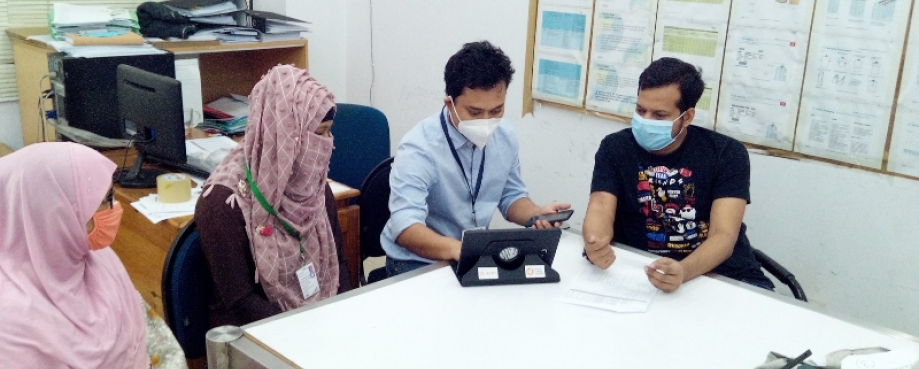
Ethical Trading Initiative is partnering with digital training supplier Quizrr to support 20 garment factories in Bangladesh to operate in a Covid-safe way, thanks to funding received from the UK Foreign, Commonwealth and Development Office (FCDO).
Covid-19 has had a devastating impact on the garment sector, interrupting both supply and demand, putting manufacturers at risk and impacting millions of low-income workers, most of whom are women.
While factories have been open for several months and workers have returned to work, the risk of infection remains a major threat and the importance of prioritising workplace adaptation, worker safety and understanding among workers, managers and supervisors alike of the steps they need to take to protect themselves remains high.
In order to quickly and effectively address the risks posed by the pandemic in RMG factories, ETI has received funding from the Vulnerable Supply Chain Facility (VSCF), a rapid COVID-19 response fund set up by the FCDO, and managed by Mott MacDonald Ltd.
The Facility has partnered with 20 UK and international retailers and brands, supporting over 100 suppliers across Bangladesh, Ethiopia, Ghana, Kenya, Myanmar, Tanzania, and Zimbabwe, and will provide economic, social, and health benefits to around 1 million women and men directly and indirectly. The initiative will trial a strong Occupational Health and Safety (OHS) component in 20 garment factories in Bangladesh nominated by 7 ETI brand members – Primark, New Look, Marks & Spencer, Tesco, Sainsbury’s, Dimensions and Arco.
The project will combine traditional, classroom-based training with innovative, tablet-based modules developed by training partner Quizrr, and aims to reach 30,000 workers and 1,000supervisors and managers in selected factories in Dhaka, Bangladesh.
ETI and Quizrr have been collaborating since 2015 on an ongoing intervention to pilot a Social Dialogue programme to garment factories in Bangladesh. The programme uses blended learning – a combination of ETI’s traditional classroom teaching with Quizrr’s tablet-based, digital media approach – to deliver awareness raising training to factory managers, supervisors and Participation Committee worker representatives. In addition to the support received from UKAid, the Social Dialogue programme is currently co-funded by the Norwegian Government’s development agency NORAD and the corporate donor HSBC.
A recent evaluation of this intervention has found many positive benefits, including increased awareness among worker representatives of their rights and responsibilities in the workplace, better industrial relations, and improved attitudes toward cooperative and collaborative relations between workers and managers.
The OHS pilot will build on this tried-and-tested training model to deliver training on occupational health and safety, in line with international guidelines, within a broad and inclusive context, addressing issues such as the importance of adhering to safety guidance when traveling to and from work and maintaining social distancing in general. The training will also be accessible via smartphones using a QR code, enabling even more users to benefit.
Learning will be shared widely after the pilot beyond the 20 factories, both within the ETI membership and with the wider garment sector and relevant stakeholders.
